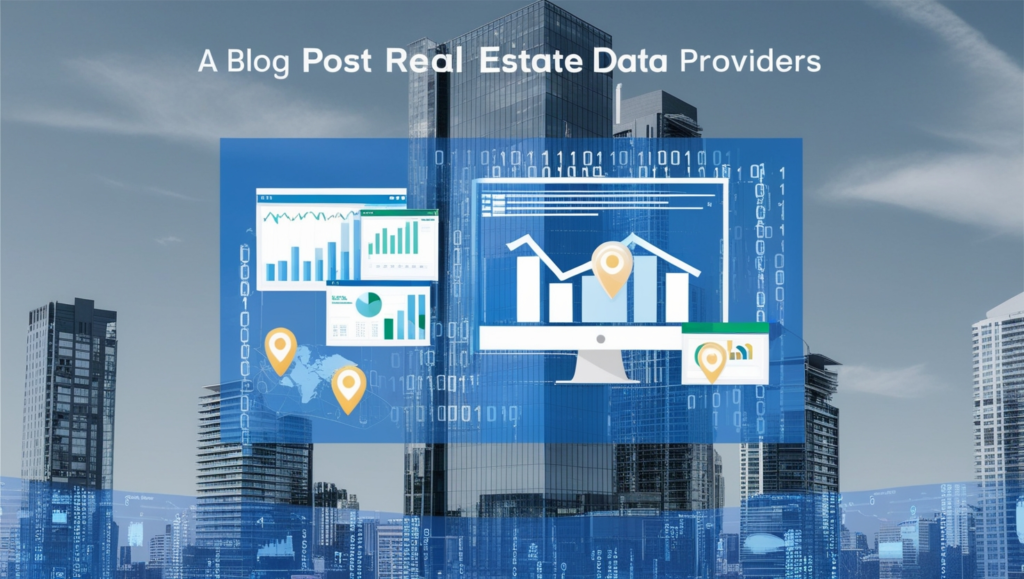In today’s dynamic real estate market, access to accurate and comprehensive property data is crucial for making informed decisions. Real estate data providers play a pivotal role in supplying this vital information to industry professionals, investors, and analysts.
This article delves into the world of real estate data providers, exploring their significance, services, and impact on the property market.
Table of Contents
Understanding Real Estate Data Providers
Real estate data providers are companies that collect, analyze, and distribute vast amounts of property-related information. These organizations serve as the backbone of the real estate industry, offering invaluable insights into property values, market trends, and demographic data.
The Importance of Real Estate Data Providers
In an era where data-driven decision-making is paramount, real estate data providers have become indispensable. They offer a wealth of information that helps stakeholders:
- Make informed investment decisions
- Identify market trends and opportunities
- Assess property values accurately
- Analyze risk factors
- Streamline property management processes
The role of real estate data providers extends beyond simply offering raw data. They provide sophisticated analytics tools and insights that can significantly impact strategic planning and operational efficiency in the real estate sector.
Types of Data Offered by Real Estate Data Providers
Real estate data providers offer a diverse range of information, catering to various needs within the industry. Let’s explore some of the key data types in more detail:
Property Listings Data
One of the primary services offered by real estate data providers is comprehensive property listings data. This includes information on:
- For-sale properties: Detailed listings of properties currently on the market, including prices, property features, and listing history.
- Rental listings: Information on available rental properties, including rent prices, lease terms, and property amenities.
- Historical sales data: Records of past property transactions, providing insights into price trends and market dynamics.
- Property features and amenities: Comprehensive details about the characteristics of each property, from square footage to unique selling points.
This data is invaluable for real estate agents, buyers, and investors looking to make informed decisions about property acquisitions or sales.
Property Valuation Data
Real estate data providers offer sophisticated valuation models that help determine property values based on various factors, including:
- Comparable sales: Recent sales of similar properties in the area, which help establish benchmark prices.
- Property characteristics: Specific features of the property that can affect its value, such as size, age, and condition.
- Location-based attributes: Factors like neighborhood quality, proximity to amenities, and local market conditions.
- Market trends: Overall market conditions and price movements that influence property values.
These valuation models are crucial for appraisers, lenders, and investors who need accurate property value estimates.
Ownership and Transaction Data
Many real estate data providers specialize in offering detailed ownership and transaction information, such as:
- Property ownership records: Current and historical information about who owns a particular property.
- Transaction history: A detailed record of past sales, including prices and dates.
- Mortgage data: Information about existing mortgages on properties, including lender details and loan amounts.
- Foreclosure information: Data on properties in various stages of the foreclosure process.
This type of data is particularly useful for title companies, legal professionals, and investors conducting due diligence.
Demographic and Neighborhood Data
To provide a holistic view of the real estate landscape, real estate data providers often include:
- Population demographics: Information about the age, income, education, and other characteristics of residents in a given area.
- Income levels: Data on average incomes, wealth distribution, and economic indicators for specific neighborhoods.
- School district information: Details about local schools, including performance metrics and student demographics.
- Crime statistics: Data on crime rates and types of crimes in different areas.
- Neighborhood amenities: Information about local features such as parks, shopping centers, and public transportation.
This contextual data is crucial for developers, urban planners, and investors looking to understand the broader environment in which a property is situated.

Leading Real Estate Data Providers in the Market
The real estate data industry is home to several prominent players. Let’s take a closer look at some of the top real estate data providers:
1. CrawlBee
CrawlBee stands out among real estate data providers for its comprehensive coverage and data aggregation capabilities. They offer:
- Property listings data: Up-to-date information on properties for sale and rent across multiple markets.
- Home ownership information: Detailed records of property ownership and historical transactions.
- Real estate transaction data: Comprehensive data on property sales, including prices and market trends.
- Commercial real estate insights: Specialized data on commercial properties, including office spaces, retail locations, and industrial facilities.
CrawlBee’s strength lies in its ability to aggregate data from multiple sources, providing a comprehensive view of the real estate market.
2. Reomnify
As one of the emerging real estate data providers, Reomnify specializes in:
- Global residential and commercial real estate data: Offering insights into property markets worldwide.
- Build-to-rent locations: Focused data on the growing build-to-rent sector, including development pipelines and market trends.
- Regular data updates: Commitment to providing the most current information to clients.
Reomnify’s global focus makes it particularly valuable for international real estate investors and multinational corporations.
3. SafeGraph
SafeGraph has established itself as one of the reliable real estate data providers, focusing on:
- Global real estate coverage: Comprehensive data on properties across various international markets.
- Commercial property data: Specialized information on commercial real estate, including foot traffic data and business location intelligence.
- Place-based insights: Unique data on points of interest and their characteristics, which can be crucial for retail and commercial real estate decisions.
SafeGraph’s integration of location intelligence with traditional real estate data sets it apart in the market.
4. APISCRAPY
APISCRAPY offers innovative solutions among real estate data providers, including:
- Real-time real estate market data: Up-to-the-minute information on property listings and market conditions.
- AI-enabled data extraction: Utilization of artificial intelligence to gather and process real estate data efficiently.
- Custom data scraping services: Tailored data collection solutions to meet specific client needs.
APISCRAPY’s focus on real-time data and AI-driven solutions makes it a valuable resource for those requiring the most current market information.
5. Matrixian
Matrixian positions itself as a location-driven data company among real estate data providers, offering:
- International data sources: Access to real estate data from various global markets.
- Smart technology integration: Use of advanced technologies to process and analyze real estate data.
- Comprehensive property datasets: Extensive information on both residential and commercial properties.
Matrixian’s emphasis on location-based data and international coverage makes it particularly useful for global real estate analysis.
The Impact of Real Estate Data Providers on the Industry
Real estate data providers have revolutionized the way industry professionals operate. Their impact is far-reaching and includes:
Enhanced Decision-Making
By providing accurate and timely data, real estate data providers empower stakeholders to make well-informed decisions. This leads to:
- More successful investments: Investors can identify promising opportunities and avoid potential pitfalls.
- Reduced risk in property transactions: Buyers and sellers can make decisions based on comprehensive market information.
- Improved portfolio management: Real estate portfolio managers can optimize their holdings based on data-driven insights.
The availability of detailed, up-to-date information has significantly reduced the guesswork in real estate decision-making, leading to more efficient and profitable outcomes.
Market Transparency
Real estate data providers contribute significantly to market transparency by:
- Offering comprehensive property information: Detailed data on property characteristics, ownership, and transaction history.
- Providing historical data for trend analysis: Long-term data that allows for the identification of market patterns and cycles.
- Enabling fair property valuations: Accurate and unbiased data that supports fair market valuations.
This increased transparency has led to more efficient markets, reduced information asymmetry, and increased trust among market participants.

Technological Advancements
Many real estate data providers leverage cutting-edge technologies, driving innovation in the industry through:
- AI and machine learning algorithms: Advanced data analysis techniques that can predict market trends and property values.
- Big data analytics: Processing and analyzing vast amounts of data to derive meaningful insights.
- Predictive modeling: Creating sophisticated models to forecast future market conditions and property performance.
These technological advancements have not only improved the quality and depth of real estate data but have also opened up new possibilities for data analysis and application.
Choosing the Right Real Estate Data Provider
Selecting the appropriate real estate data provider is crucial for businesses and individuals alike. Consider the following factors when making your choice:
Data Quality and Coverage
Ensure that the real estate data provider offers:
- Accurate and up-to-date information: The data should be reliable and current to support effective decision-making.
- Comprehensive coverage of your target market: The provider should have extensive data on the specific geographic areas or property types you’re interested in.
- Regular data updates: Frequency of updates is crucial, especially in dynamic real estate markets.
It’s important to verify the data sources and methodologies used by the provider to ensure the highest quality of information.
Data Delivery Methods
Look for real estate data providers that offer flexible data delivery options, such as:
- APIs for seamless integration: Allow for easy incorporation of real estate data into existing systems and applications.
- Bulk data downloads: Useful for those who need to process large amounts of data offline.
- Customizable reports: Tailored reports that present data in a format that aligns with your specific needs.
The right delivery method can significantly impact the usability and value of the data for your organization.
Pricing and Subscription Models
Compare pricing structures among different real estate data providers, considering:
- Pay-per-use options: Suitable for occasional users or those with specific, limited data needs.
- Subscription-based models: Often more cost-effective for regular users who need ongoing access to data.
- Custom pricing for specific data needs: Some providers offer tailored pricing for unique or extensive data requirements.
It’s important to balance the cost of the data service with the potential value it can bring to your business or investment strategy.
Customer Support and Services
Choose real estate data providers that offer:
- Responsive customer support: Ability to get help quickly when you need it.
- Training and onboarding assistance: Support in learning how to effectively use the data and associated tools.
- Data consultation services: Expert advice on how to best leverage the data for your specific needs.
Good customer support can significantly enhance the value you derive from a data provider’s services.
The Future of Real Estate Data Providers
As technology continues to evolve, real estate data providers are poised for significant growth and innovation. Some emerging trends include:
Integration of Alternative Data Sources
Real estate data providers are increasingly incorporating alternative data sources, such as:
- Satellite imagery: Using aerial images to assess property conditions, development progress, and environmental factors.
- Social media sentiment analysis: Gauging public opinion about neighborhoods and properties through social media data.
- IoT sensor data: Leveraging data from smart buildings and cities to provide insights into property usage and performance.
These alternative data sources are adding new dimensions to real estate analysis, offering insights that were previously unavailable.
Enhanced Predictive Analytics
Advanced machine learning algorithms are enabling real estate data providers to offer more accurate predictive analytics, including:
- Future property value projections: Sophisticated models that forecast how property values might change over time.
- Market trend forecasts: Predictions about future market conditions, including supply and demand dynamics.
- Investment opportunity identification: Automated systems that can spot potentially lucrative investment opportunities.
These predictive capabilities are becoming increasingly valuable in a fast-paced and competitive real estate market.
Increased Focus on Data Privacy and Security
As data regulations become more stringent, real estate data providers are prioritizing:
- Robust data protection measures: Implementing advanced security protocols to protect sensitive information.
- Compliance with privacy laws: Ensuring that data collection and usage practices align with regulations like GDPR and CCPA.
- Ethical data collection practices: Developing transparent and responsible methods for gathering and using real estate data.
This focus on data privacy and security is crucial for maintaining trust and compliance in an increasingly data-driven industry.
Case Studies: Success Stories with Real Estate Data Providers
To illustrate the impact of real estate data providers, let’s examine a few success stories:
Case Study 1: Investment Firm Maximizes Returns
A leading investment firm partnered with a top real estate data provider to:
- Identify undervalued properties in emerging markets: Using comprehensive market data to spot opportunities others might miss.
- Analyze potential risks and rewards: Leveraging predictive analytics to assess the potential outcomes of different investment strategies.
- Make data-driven investment decisions: Basing investment choices on solid, quantifiable data rather than intuition alone.
Result: The firm saw a 30% increase in their portfolio’s performance within the first year, significantly outperforming market benchmarks.
Case Study 2: Real Estate Agency Streamlines Operations
A national real estate agency utilized services from multiple real estate data providers to:
- Automate property valuation processes: Implementing AI-driven valuation models to quickly and accurately price properties.
- Enhance lead generation efforts: Using demographic and behavioral data to identify and target potential buyers more effectively.
- Provide clients with comprehensive market insights: Offering detailed, data-backed market analysis to help clients make informed decisions.
Result: The agency reduced operational costs by 25% and increased client satisfaction rates by 40%, leading to significant business growth.
Case Study 3: Government Agency Improves Urban Planning
A city planning department leveraged data from real estate data providers to:
- Analyze property usage patterns: Using big data analytics to understand how different areas of the city were being utilized.
- Identify areas for infrastructure development: Pinpointing locations where new infrastructure could have the most significant impact.
- Make informed zoning decisions: Basing zoning changes on comprehensive data about property values, demographics, and economic trends.
Result: The city saw a 15% increase in property values and a 20% reduction in urban sprawl over five years, leading to more sustainable and efficient urban development.
Case Study 4: Mortgage Lender Optimizes Risk Assessment
A major mortgage lender incorporated advanced analytics from a leading real estate data provider to:
- Enhance credit risk models: Integrating property data with traditional credit information for more accurate risk assessment.
- Predict property value trends: Using AI-driven forecasting to anticipate future property values and market conditions.
- Streamline the underwriting process: Automating much of the property valuation and risk assessment process.
Result: The lender reduced default rates by 18% and increased its loan approval speed by 40%, significantly improving both risk management and customer satisfaction.
Case Study 5: Commercial Real Estate Developer Expands Portfolio
A commercial real estate developer utilized comprehensive data from multiple real estate data providers to:
- Identify emerging business districts: Using demographic and economic data to spot areas poised for commercial growth.
- Assess potential tenant demand: Analyzing foot traffic data and business growth trends to forecast potential occupancy rates.
- Optimize property designs: Leveraging data on tenant preferences and usage patterns to inform building designs.
Result: The developer successfully entered three new markets, achieving 95% occupancy rates in their new properties within the first year of operation.

The Role of Real Estate Data Providers in Market Analysis
Real estate data providers play a crucial role in facilitating in-depth market analysis. This analysis is essential for various stakeholders in the real estate industry, including investors, developers, and policymakers. Here’s how real estate data providers contribute to market analysis:
Supply and Demand Dynamics
Real estate data providers offer insights into:
- Current inventory levels: Data on the number of properties available for sale or rent in specific markets.
- Construction pipeline: Information about upcoming developments and their potential impact on supply.
- Absorption rates: Data on how quickly properties are being sold or leased in different areas.
This information helps stakeholders understand the balance between supply and demand in various markets, informing decisions about development, investment, and pricing strategies.
Price Trend Analysis
By aggregating historical and current pricing data, real estate data providers enable:
- Price appreciation studies: Analysis of how property values have changed over time in different areas.
- Rental rate trends: Insights into how rental prices are evolving in various markets.
- Price-to-income ratios: Data that helps assess the affordability of properties in different regions.
These price trend analyses are crucial for investors looking to identify markets with strong growth potential and for policymakers addressing housing affordability issues.
Comparative Market Analysis
Real estate data providers facilitate comparative market analysis by offering:
- Detailed property comparisons: Data that allows for side-by-side comparisons of similar properties.
- Neighborhood-level insights: Information about how different areas within a city or region compare in terms of property values and market dynamics.
- Historical performance data: Information about how different markets have performed over time, allowing for long-term comparisons.
This comparative data is invaluable for real estate professionals
Conclusion
Real estate data providers have revolutionized the property industry, offering invaluable insights that drive informed decision-making and market efficiency. As technology advances, these providers will play an increasingly crucial role in shaping the future of real estate. From enhancing investment strategies to improving urban planning, the impact of quality real estate data is far-reaching and transformative.
For professionals in the industry, partnering with the right real estate data provider can provide a significant competitive edge in today’s fast-paced property market. We encourage you to share your experiences with real estate data providers in the comments below – how has data transformed your approach to real estate?
